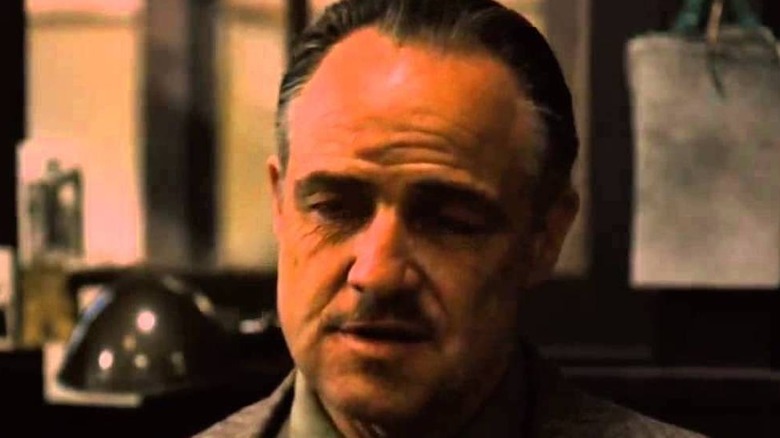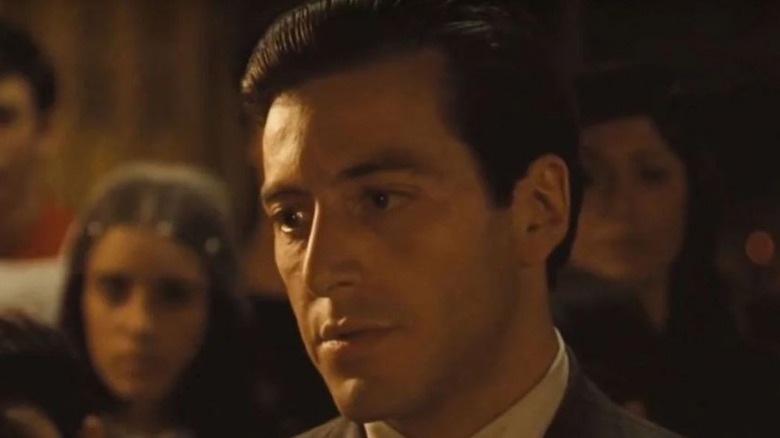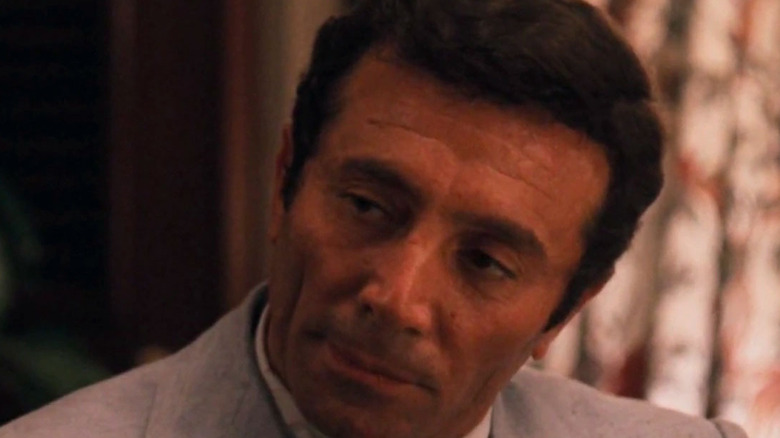Is The Godfather Based On A True Story?
According to the AFI, it's the second greatest movie ever made after "Citizen Kane." A masterpiece and credit to the gangster movie genre, Francis Ford Coppola's "The Godfather" is a classic tale of Michael Corleone's introduction to the family business of organized crime and the power struggle he finds himself dealing with. The film, which was released in 1972, boasted the incredible talents of Maron Brando, Al Pacino, James Caan, Robert Duvall, and Diane Keaton, "The Godfather" earned two Academy Award wins. Much like "Goodfellas" or "Casino," it's a film that so many others of its genre would kill to be in the same conversation with, and only a few are lucky enough to be in.
But as is often the case with some stories set in this world, like "The Untouchables" or "Goodfellas", how much of what we see on the screen turns out to be true? Was there a Don Vito Corleone, and did his son Michael take over handling things when times got tough? When it comes to "The Godfather", is this the real life, or is this just fugazi?
The Godfather goes by the book
In the story of severed horse heads and stolen cannolis, Francis Ford Coppola's "The Godfather" is actually based on a book of the same name. Mario Puzo's novel was published in 1969, a mere three years before the film. It told the fictional tale of the Corleone family and the battle they were in the midst of with the other four major crime families in New York City in the 1940s. It became a huge success, selling over 9 million copies in two years (via CBS) and drawing Paramount Pictures' attention to adapt the book to screen.
Puzo made a deal with the studio for rights to adapt the book and co-wrote the script with Coppola. He'd return to writing with the director again in 1974 and 1990 for the two sequels that followed, "The Godfather Part II" and "The Godfather Part III." As far as the first installment goes, the film follows the source material closely regarding Michael's eventual decision to take revenge for his father's attempted murder, escaping to Sicily, and returning home, where he eventually takes the title of Godfather. Woven together with honor, treachery, and deceit, the film is a testament to the flawless direction of Coppola and the incredible writing of Puzo that introduced audiences to a world they had little understanding of. As unbelievable as "The Godfather" was, though, there were some elements in Michael Corleone's world that weren't too different from our own.
'Michael, is it true?'
The most notable ingredient to "The Godfather" is the existence of the Five Families, a real quintet of existing criminal groups within organized crime that were established in 1931. As reported by Den Of Geek, Vito Corleone is also confirmed as an amalgamation of real mobsters Frank Costello, Carlo Gambino, and Joe Profaci. Regarding Michael, his journey also echoes that of real-life gangster Salvatore "Bill" Bonanno, who changed his trajectory from law school to the family "business" following the kidnapping of his father, Joseph Bonanno.
Another central plot point was that of Johnny Fontane (Al Martino), who many believed was based on a famous singer — and was played by one. Seen begging Don Vito on the day of his daughter's wedding, the failing singer asks for his assistance in getting a film part to get his career back on track. One severed horse head later, and the offer that can't be refused got him the gig. This drew comparisons to legendary singer Frank Sinatra, who had been linked several times to organized crime. So much so that, according to History, the FBI had monitored him for nearly 40 years.
In the book, Fontane wins an Oscar for his performance, much like Sinatra did for his Best Supporting role in "From Here to Eternity." The connection was spotted by Ol' Blue Eyes himself, who refused to speak to Puzo following a chance encounter. "The Godfather" author wrote about the meet in New York Magazine, recalling, "I remember that, contrary to his reputation, he did not use foul language at all. The worst thing he called me was a pimp, which rather flattered me." Puzo had no choice but to leave the restaurant with an enraged Sinatra behind him.
Similarities and successes aside, the comparisons to real-life elements in "The Godfather" are unavoidable. It might not be based on a true story, but it is undoubtedly one of the most influential of its kind in film history.


